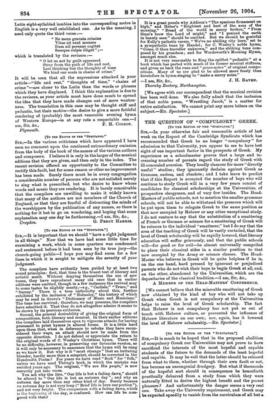Sin,—It is important that we should " have a right
judgment in all things." Now that we have had some little time for examining a work, which in some quarters was condemned and sentenced before it had been seen by its true jury—the church-going public—I hope you may find room for a few lines in which it is sought to mitigate the severity of your
The compilers have evidently been guided by at least two sound principles : first, that time is the truest test of literary and artistic merit. Without denying themselves the use of new tunes, they have reproduced many old ones that in earlier editions were omitted, though in a few instances the revived may to some tastes be slightly musty,—e.g., "Carlisle," "Truro," and " Surrey." There is a true catholicity about this, further exhibited by the inclusion of " Helmsley," the history of which may be read in Grove's " Dictionary of Music and Musicians." The tune has survived; therefore, we may presume, the compilers have admitted it. That they do not altogether admire it seems to be shown by its previous exclusion. Second, the general desirability of giving the original form of compositions, both literary and musical. In their earlier editions the compilers laid themselves open to vigorous attacks for having presumed to print hymns in altered forms. It is a little hard upon them that, when in deference to rebuke they have recon- sidered their ways, an attack should now be made from the opposite direction. I do not defend or appreciate the return to the original words of C. Wesley's Christmas hymn. There will be no difficulty, however, in preserving our favourite version, as it will only be necessary to announce that the hymn will be sung as we know it. But why is it " most strange " that an irritating blunder, hardly more than a misprint, should be corrected in the Hundredth Psalm ? For years we have read " flock " for " folk," unless we have used Thring's book, in which the mistake was rectified years ago. The original, " We are His people," is now correctly put into verse. You ask why the line, "Our life is but a fading dawn," should be altered to " Our life is but an autumn day "; and why an autumn day more than any other kind of day. Surely because an autumn day is not very long (" Brief life is here our portion"), and not very bright. The comparison with a fading dawn, which is the beginning of the day, is confused. How can life be com- pared with that? It is a great puzzle why Addison's "The spacious firmament on high," and Heber's "Brightest and best of the sons of the morning," "Bread of the world in mercy broken," "From Sinai's brow the Lord of might," and "I praised the earth in beauty seen" should be omitted. But we should be grateful for Kelly's pathetic verses, " We've no abiding city here," set to a sympathetic tune by Handel ; for C. Wesley's noble hymn, "Come, 0 thou traveller unknown," and the striking tune com- posed by his grandson ; and for Wordsworth's Morning Hymn, amongst much else. It is not very reasonable to fling the epithet "pedantic" at a book which has parted with much of its former musical stiffness, and given us back the runs and "grace-notes" of original compo- sitions. Many of us are glad to be allowed more freely than heretofore in hymn-singing to "make a merry noise."
—I am, Sir, &c., J. H. RAVEN.
[We agree with our correspondent that the musical revision has been well done. We also fully admit that the inclusion of that noble poem, " Wrestling Jacob," is a matter for entire satisfaction. We cannot print any more letters on the subject.—En. Spectator.]














































 Previous page
Previous page